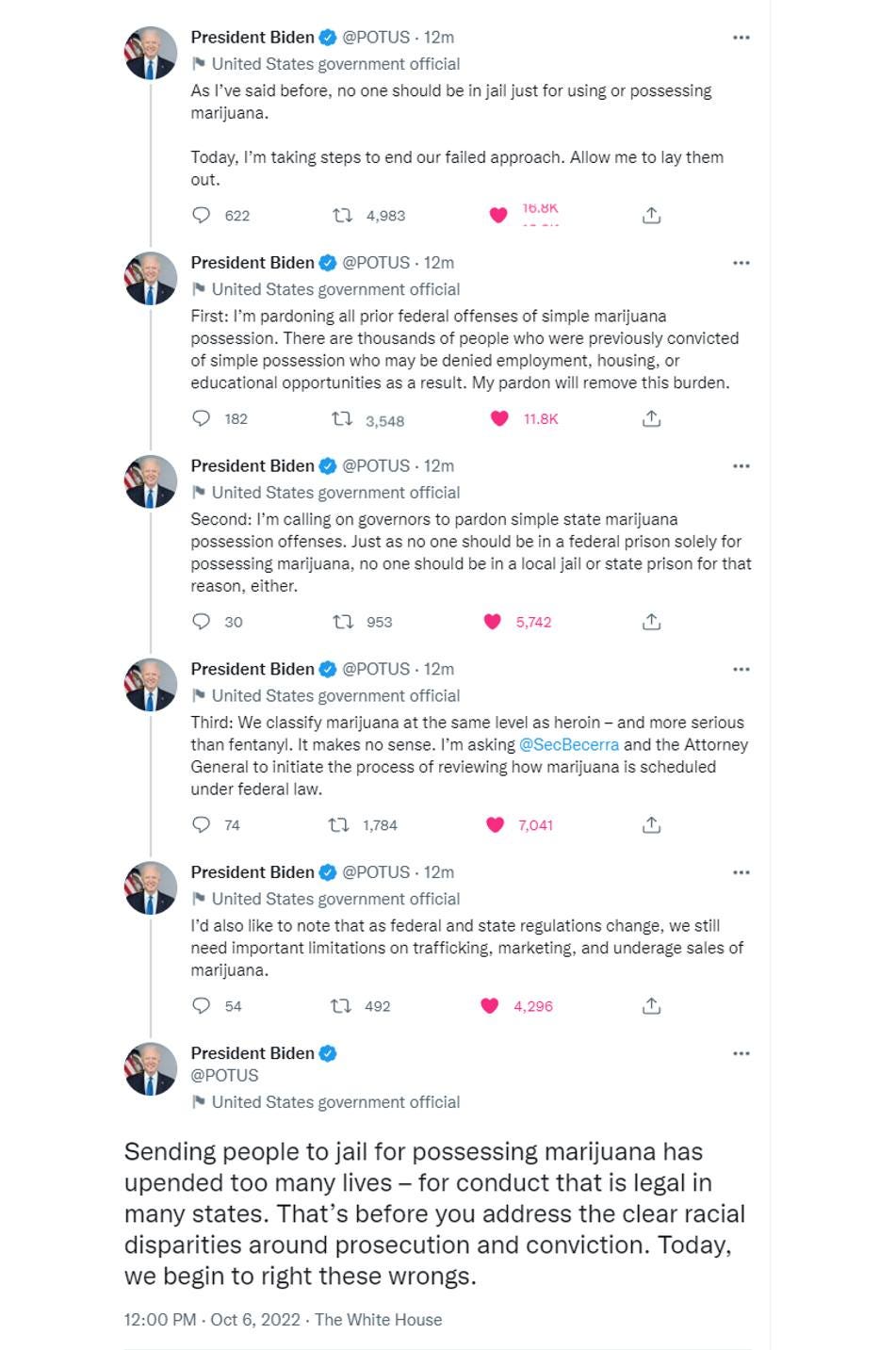Holographic weapon sights are unique in that even with parts of the sight destroyed, the sight still functions. Much the same way, a minimally rigorous sample of current events and political readings can provide a clear sight picture onto events, even taken through a (knowingly) fragmented perspective.
It’s a question of seeing the whole of things, in part of things; as with a hologram, the shape of things is reflected in fragments of how things are, not just the whole.
The event occasioning a need to re-synthesize a basic “lay of the land” should be fairly obvious to people reading this within a few days of its writing.
For posterity, we’re talking about Biden’s announcement with regard to pardons and potential de-scheduling of cannabis.

The ultimate stakes here are the midterm elections. A lot of events are riding on the outcomes here, including Ukraine aid, women’s bodily autonomy, the rise of disinformation, confabulation, and conspiracy theory, as politics; and, probably most importantly, the status of American institutions of democracy themselves.
The idea that “our democracy is under attack!” is usually the most very general kind of statement, accompanying things like vague election reform initiatives and calculatedly anodyne, agreeable-to-everyone incremental reforms. Today, it’s almost hard to recall a time before 2016 when this wasn’t a daily reality.
The front lines of the attack on our democracy through strategic manipulation and institutional undermining are midterm Congressional campaigns. For a variety of in-the-weeds, localized strategic reasons that I don’t want to get into at length (to the degree I get into anything at length in these) I concur with “conventional wisdom” readings, that assess Democratic control of the Senate is more likely.
The House of Representatives is the problem. If Republicans win the House, a lot of bad things happen, a lot of good things stop happening, and a lot of even worse things go dramatically up in risk. Ukraine aid, obviously, is one aspect of things that is under attack; as Ruben Gallego says, it’ll be handing over an entire chamber of our legislature to Tucker Carlson foreign policy.

But I’m an American, and I’ve been resistance since 2017. I care about Ukraine a lot as a citizen of the world - to the point that I’ve given a lot of the past few months to research and investigation against Russian targets involved in their illegal war on Ukraine, before NAFO. I’m not in a great position to go fighting fascism halfway around the world when I’m not doing anything about it at home.
The information war at home is happening around the elections, and the stakes are the future of our democracy itself. The attack on American institutions of democracy that’s going here have a very clear, “telegraphed” plan of attack involving the Speaker of the House of Representatives. Quoting Amy Gardner in the Washington Post today:
The implications will be lasting: If Republicans take control of the House, as many political forecasters predict, election deniers would hold enormous sway over the choice of the nation’s next speaker, who in turn could preside over the House in a future contested presidential election. The winners of all the races examined by The Post — those for governor, lieutenant governor, secretary of state, attorney general, Senate and House — will hold some measure of power overseeing American elections.
The risks are greater than Matt Gaetz’s frankly stupid plan to make Trump the Speaker of the House; it’s part of a broader nationwide plan to elect election-denialist Secretaries of State and election officials to disrupt the 2024 election. In combination with a wildly unpopular Supreme Court that has lost the approval of a majority of the American populace, the faith of our people in our government - the basis of its institutions’ integrity - risks crisis of the type typically preceding fascism.
This chain of potential events makes the political impact of Biden’s marijuana announcement directly relevant to our fight to preserve our country against avowed anti-electionists and fascists.
The good, and fairly obvious news, is that legalizing marijuana is broadly popular; as POTUS notes, it’s already legal in some states, like mine - there’s literally a weed dealership in my town, not a dispensary, a store with glass counters and about a dozen staff (and security guards) politely trying to keep a straight face while selling you Cat Piss 9000 Super Kush Indica Hippie Dippie Haze (this is probably a real product name somewhere). There’s support for legalization even in states where it’s not legal and it’s been trending upwards for decades.

More recently NORML polls find that “(e)ight out of ten Americans support the medical use of marijuana, and nearly 3 out of 4 Americans support a fine-only (no jail) for recreational smokers.”
The early political reactions to Biden’s move on the Republican side suggest divisions. Stephen Collinson in CNN reports that Abbott and “libertarian” (to the degree that means anything anymore post-brony Spike Cohen) advocacy group Americans for Prosperity are essentially on opposite sides of this; and, as Collinson points out:
In a major report released last week, the Republican Study Committee – a leading House GOP caucus – released policy recommendations for conservatives and highlighted opposition to any moves to make marijuana more accepted.
“Marijuana remains a federally scheduled controlled substance, but that has not stopped more and more states and localities from legalizing it under their own laws. This has led to an explosion of marijuana use among children, which is having a hugely negative impact on their health,” the report said.
“Congress should not legalize marijuana, while also taking steps to constrain this new industry’s ability to harm children.”
This is going to come down to a governor-by-governor, state-by-state decision, as the ACLU’s statement on the Biden announcement seems to frame it. The pardons are a central feature from a legal perspective as well as from political one; it has to do with race (everything in America ends up having to do with race, so, that’s hardly a surprise).
To a degree, Biden’s marijuana announcement plays into Republican anti-crime messaging; this is quite clearly a central focus of Republican campaigns nationally, as Michelle L. Price and Jesse Bedyan assess in AP two hours ago on October 6th. This is a somewhat hypocritical position to be in, as Rachel Bitecofer’s advertising & advocacy work discusses:

Consistency, however, is ever the irrelevance to the tribalist, disinformation-addled Republican mind; I don’t know that pointing out the inconsistency is going to do as much as enframing it as an independent attack narrative the way that Bitecofer (quite properly) does.
There’s any variety of fairly squishy, opinion-masquerading-as-fact statements we could make about how things are going to shake out, and I’d expect to see some variants on these statements in the next few days:
“Biden is going to ‘tank’ Republican anger and discontent like an MMORPG character and keep it away from midterms candidates” - akin to the “AOC is doing Democrats a favor by keeping the national conversation about her all the time” as an argument, and about as wise, I think
“Dark Brandon is back! This shows he doesn’t care about the backlash for doing the right thing” - except, according to the CNN article above, Biden was actually hesitant to go all the way with legalization; we’re looking at a processual, compromise result with today’s actions
“Biden’s giving Republicans something to attack him on! This is folly!” - except marijuana legalization is broadly popular even with Republicans’ own electorates
“Biden’s giving Democrats something to believe in! This is smart!” - except, as compared to other Biden initiatives like the White House task force on Dobbs, his repeated emphasis on the literal and not figurative fate of democracy being at stake, and a repeat of the start of World War II happening in Europe, except nuclear this time… I don’t think Biden’s lack of things that he’s giving people to believe in is his problem
It’s dangerously close to a contrarian-for-its-own-sake, purposefully counter-intuitive statement on my part, but I suspect that the attack narratives this generates, not for Republicans, but for Democrats, against Republicans who will react badly to this announcement, may end up being the most significant impact here.
It’s a pretty good reflexive-control move, quite frankly; I think the Biden Administration’s political people have a very good, strategic sense of the politics of the moment and how to intervene in them and reset them. They probably know better than Republicans do, at this point, how Republicans will react. The rest of us will have to see how things shake out as the facts develop, I suppose.
At the very least, the fragments that we can see from a sampling of very early reactions right now, as things sit in flux without pundits and experts trying to call a trend into existence… I think, politically, it’s a lot more about the attacks on Republicans this opens up than the defenses of Democrats that it shores up.




